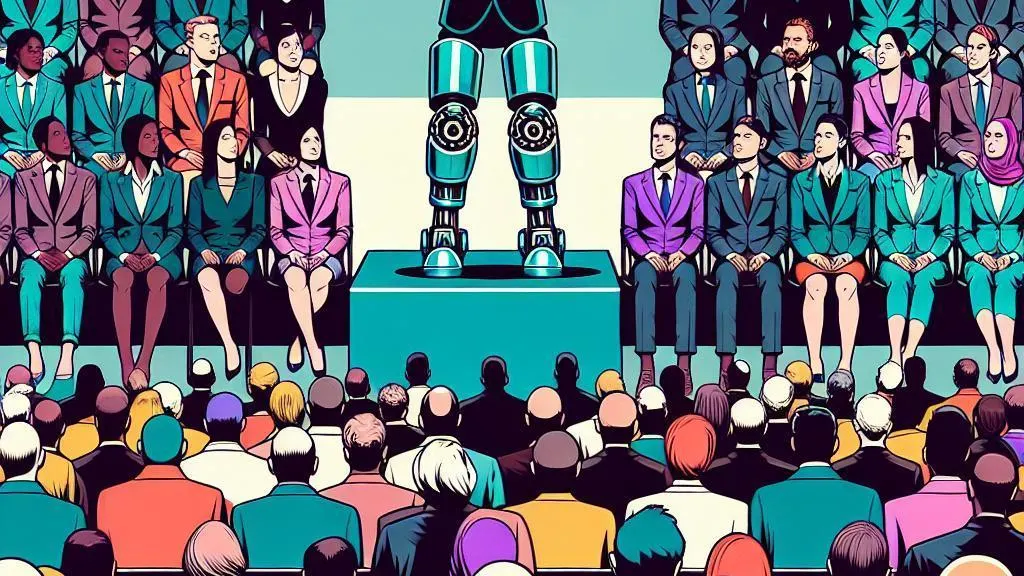How can small businesses implement AI to streamline and automate invoice processing?
Artificial intelligence (AI) has revolutionised various industries, and small businesses can significantly benefit from its …

AI is reshaping industries worldwide, and the event sector is no exception. As virtual events become increasingly prevalent, AI plays a pivotal role in transforming how we conduct and experience these gatherings.
One of the most intriguing developments is the emergence of AI presenters or virtual speakers. This article delves into the world of AI in events, exploring its potential, applications, and the question on everyone's mind: Will AI presenters replace human speakers at virtual events?
The global AI market is projected to reach $733.7 billion by 2027, growing at a compound annual growth rate (CAGR) of 42.2% (Grand View Research). This explosive growth is reflected in the event industry, where AI is integrated into various aspects of event planning, execution, and attendee engagement.
AI presenters, or talking avatars, represent a significant leap in event technology. These computer-generated virtual characters can deliver speeches and presentations and interact with audiences in multiple languages. Companies like Synthesia and D-ID are pioneering this technology, offering a range of AI avatars capable of creating professional videos in minutes.

One of the most significant advantages of AI presenters is their ability to deliver content in multiple languages and accents. This feature breaks down language barriers, making events global and accessible to diverse audiences.
AI presenters eliminate the need for actors, crews, and studios, significantly reducing production costs and time. They also allow for easy updates or revisions, a feature not feasible with human presenters.
AI can be used to create personalized experiences for attendees. From AI-powered chatbots answering queries to virtual assistants guiding participants through the event, AI enhances user experience and engagement.
Rapid Advancements in AI Avatars and Voice Technology
The landscape of AI presenters is evolving at an unprecedented pace, with significant improvements in both visual and auditory aspects:
Visual Realism: Companies like Unreal Engine are pushing the boundaries of photorealistic digital humans. Their MetaHuman Creator tool allows for creating highly detailed, lifelike digital avatars in a fraction of the time it would take traditional CGI artists.
Emotional Expression: AI avatars are becoming increasingly sophisticated in expressing emotions. Soul Machines' Digital People technology uses a digital brain to create more natural and emotionally responsive avatars.
Voice Synthesis: Text-to-speech technology has made remarkable strides. WaveNet, developed by DeepMind, produces highly natural-sounding speech that is often indistinguishable from human voices. Companies like Resemble AI and Descript offer voice cloning services to recreate a person's voice with high fidelity.
Real-time Interaction: Natural language processing (NLP) advances are enabling more fluid, context-aware conversations. GPT-3 and its successors are pushing the boundaries of what's possible in AI-human interactions.
Neon: Samsung's artificial human project created Neon, a collection of AI-powered digital avatars that can engage in natural conversations and express emotions.
Xiaoice: Microsoft's AI system in China has hosted TV programs and even written a book of poetry, showcasing the potential of AI in content creation and presentation.
AI News Anchors: China's Xinhua News Agency introduced AI news anchors in 2018, which have since been used to deliver news reports in multiple languages.
Virtual Influencers: While not strictly presenters, AI-driven virtual influencers like Lil Miquela and Shudu showcase the potential of digital avatars in engaging audiences.

While AI presenters offer numerous advantages, human speakers bring unique experiences, perspectives, and the ability to engage in dynamic, real-time interactions with the audience. The emotional connection and authenticity that skilled human presenters provide remain challenging for AI to replicate fully.
The future likely lies in a hybrid approach, where AI and human presenters complement each other. AI could handle routine presentations or multilingual content delivery, while human speakers lead interactive sessions and keynote addresses.
We can expect more sophisticated and realistic AI presenters as AI technology evolves. Improvements in natural language processing and emotional AI could address current limitations.
As AI becomes more prevalent in events, ethical considerations around transparency and disclosure will become increasingly important. Event organizers will need to balance innovation and authenticity.
The integration of AI into the event industry, particularly in the form of AI presenters, marks a new era in how we conceive and execute virtual events.
While AI presenters offer exciting possibilities in terms of cost-effectiveness, scalability, and multilingual capabilities, they are unlikely to replace human speakers shortly completely.
Instead, the most successful events will likely leverage the strengths of both AI and human presenters, creating diverse, engaging, and globally accessible experiences. As we continue to explore and refine AI technologies, the future of virtual events promises to be more innovative and inclusive than ever before.
Some other posts you may like

How can small businesses implement AI to streamline and automate invoice processing?
Artificial intelligence (AI) has revolutionised various industries, and small businesses can significantly benefit from its …
June 28, 2024
Read More
how to design an ai marketing strategy
In today’s rapidly evolving digital landscape, artificial intelligence (AI) has become more than just a …
June 28, 2024
Read More